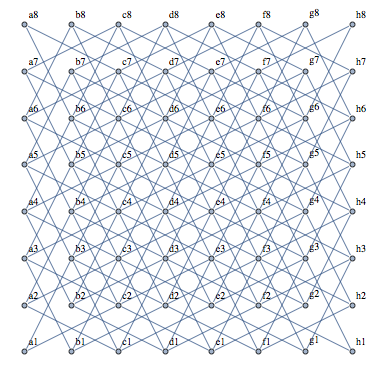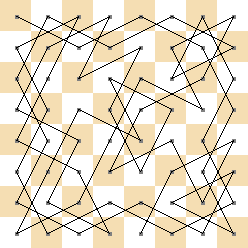This was a previous homework assignment I was required to do. While I did the assignment and turned it in for credit, I am not completely satisfied with the result I have. The rule for the assignment is it HAS to use backtracking and HAS to let the user pick a point which they want to start. It works well enough for boards less than size 8, but once it reaches 8 it takes an incredibly long time. Too long.
import java.awt.Point;
import java.util.Scanner;
/**
* The Knight's Tour using backtracking
*
* @author Tyler Weaver
*/
public class TheKnigthsTour {
private final static int BOARD_LENGTH = 8; //The length of the board
private static int board[][]; //The simulated board
//List of possible moves for the knight
private static final Point[] MOVES = new Point[]{new Point(-2, -1),
new Point(-2, 1), new Point(2, -1), new Point(2, 1), new Point(-1, -2),
new Point(-1, 2), new Point(1, -2), new Point(1, 2)};
public static void main(String[] args) {
Scanner in = new Scanner(System.in);
System.out.printf("Enter starting row (0-7): ");
int row = in.nextInt();
System.out.printf("Enter starting column (0-7): ");
int col = in.nextInt();
solveTour(row, col);
}
/**
* Helper method to determine if a square is safe for the knight
*
* @param row the row the knight is on
* @param col the column the knight is on
* @return true if the square is safe for the knight
*/
private static boolean isSafe(int row, int col) {
return ((row >= 0 && row < BOARD_LENGTH)
&& (col >= 0 && col < BOARD_LENGTH)
&& (board[row][col] == -1));
}
/**
* Helper method to print the tour solution to the console
*/
private static void printTour() {
for (int r = 0; r < BOARD_LENGTH; r++) {
for (int c = 0; c < BOARD_LENGTH; c++) {
System.out.printf("%-8d", board[r][c]);
}
System.out.printf("%n");
}
}
/**
* Solves the knight's tour using backtracking
*
* @param sRow the starting row
* @param sCol the starting column
*/
public static void solveTour(int sRow, int sCol) {
board = new int[BOARD_LENGTH][BOARD_LENGTH];
//Make all of board -1 because have not visited any square
for (int r = 0; r < BOARD_LENGTH; r++) {
for (int c = 0; c < BOARD_LENGTH; c++) {
board[r][c] = -1;
}
}
board[sRow][sCol] = 1;
if (solveTour(sRow, sCol, 2)) {
printTour();
} else {
System.out.printf("No Solution!%n");
}
}
/**
* Helper method that solve the tour
*
* @param row the current row
* @param col the current column
* @param kthMove the current move
* @return true if there is a solution to the knight's tour
*/
private static boolean solveTour(int row, int col, int kthMove) {
//Base case
if (kthMove > BOARD_LENGTH * BOARD_LENGTH) {
return true;
}
for (Point p : MOVES) {
int nextRow = row + (int) p.x;
int nextCol = col + (int) p.y;
if (isSafe(nextRow, nextCol)) {
board[nextRow][nextCol] = kthMove;
kthMove = kthMove + 1;
if (solveTour(nextRow, nextCol, kthMove)) {
return true;
} else {
board[nextRow][nextCol] = -1;
kthMove = kthMove - 1;
}
}
}
return false;
}
}
I have tried doing research online to find more ways to be efficient. Many of the solutions, however, use a technique other than backtracking. While I agree that backtracking is not the best recursive solution, it is one I am required to use. There is one solution that mentioned using data structures to improve time but I am unsure where to even begin with that.
Here is some sample output from the program if it is any help:
BOARD_LENGTH = 5;
Enter starting row (0-7): 2 Enter starting column (0-7): 3 No Solution!
BOARD_LENGTH = 7;
Enter starting row (0-7): 0 Enter starting column (0-7): 0 1 14 3 38 5 34 7 12 39 10 33 8 37 26 15 2 13 4 25 6 35 40 11 32 9 36 27 44 19 16 21 24 45 48 29 22 41 18 31 28 43 46 17 20 23 42 47 30 49
Even for board length of 7 it takes a long time to compute if the starting location is not (0, 0).
In what ways can I improve the time of computing a solution for this program?


